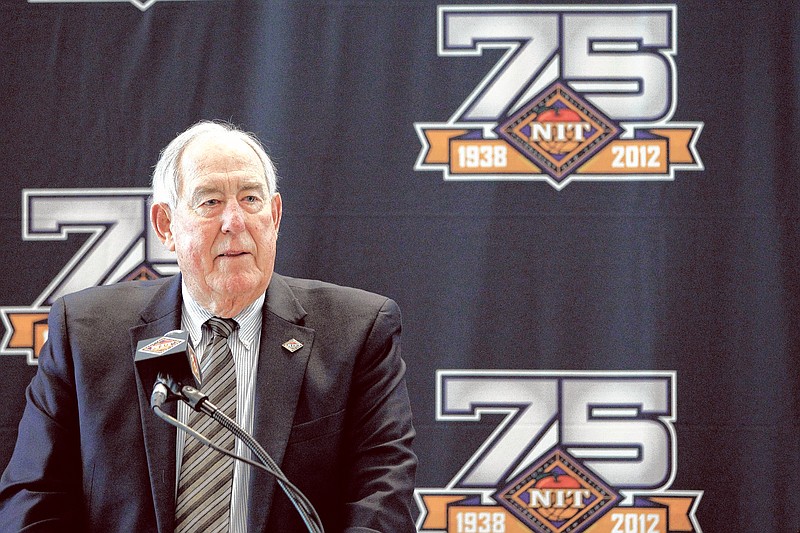Every now and then, especially during basketball season, I'd reach out to him, needing to pick the brilliant brain of the sweetest, toughest, brightest, most fair-minded man that college hoops has ever known.
He often didn't immediately answer those calls, but within 24 hours I'd hear the following recording on my answering machine: "Mark, C.M. Newton here. Sorry I missed your call. Hope you and Julie and the kids are doing well. I should be home for the next couple of days."
And he would be. And when we finally connected, he'd talk in that easy, reassuring Southern voice of his for as long I had questions that needed answering.
On Monday, that voice fell silent for good. Newton died of natural causes at the age of 88. And with that passing, not just college basketball but college athletics in general lost perhaps its wisest and most honorable voice.
Not that he ever viewed himself that way. Despite playing for the legendary Kentucky basketball coach Adolph Rupp and working for the even more legendary Alabama football coach Paul "Bear" Bryant, despite helping pick the original Olympic "Dream Team" in 1992 and heading the NCAA rules committee that adopted the shot clock and 3-point line, despite starting the first all-black starting five in SEC history while at Alabama, and twice guiding Vanderbilt to the NCAA tournament, and hiring Kentucky's first black head coaches for both men and women - Tubby Smith and Bernadette Locke-Mattox - he always was a stunningly humble individual.
Or as former Kentucky president David Roselle told the Lexington (Kentucky) Herald-Leader late Monday: "Kind of an aw-shucks kind of guy."
Yet that outward image belied a toughness rarely present in most men, but particularly white Southerners of Newton's generation.
In that same Herald-Leader article, recalling Newton's integration of Bama basketball six years after Governor George Wallace had attempted to physically block black students from entering the university, civil rights advocate Richard Lapchick noted, "C.M. was a pioneer for using sport for racial equality in America. He performed courageous acts when other white sports leaders stood on the sidelines."
How courageous? When Newton made Wendell Hudson the school's first black scholarship signee in 1969, someone set a cross on fire in the coach's yard. Undeterred, Newton was starting five blacks by the fall of 1973, a decision that would lead to three straight SEC regular-season championships or co-championships.
Said Kentucky coach John Calipari to the Herald-Leader: "When you think about it, who would have the courage to do that? People say to me, 'Yeah, you're progressive that way.' But it was a different time. It's a lot easier to be progressive today."
Of course, Newton never saw himself that way. He even told Hudson's mother during the recruiting process: "I'm a middle-class white guy. I don't know what it'll be like for him. I do know how I'll treat him. If he needs hugging, I'll hug him. If he needs fussing at, I'll fuss at him."
Asked about keeping so many good black players in Alabama when the trend was to go out of state, Newton pointed to Bryant's power and influence.
"We'd been there a couple of years and we weren't doing very well," he told me during an SEC basketball media day gathering a few years ago. "Coach Bryant asked me if there was anything he could do to help. I gave him a list of five guys we were recruiting in the state. Within a week, we'd gotten commitments from four of them. I don't know what he did, but I'm sure glad he did it."
A single example of how good a coach he was with those players: In 1976 Indiana went undefeated, winning four of its five NCAA tourney games by an average of 15.2 points. Its Sweet 16 win was a 74-69 nailbiter against the Crimson Tide.
Former Vanderbilt great and longtime NBA veteran Will Perdue told media outlets Monday, "(Newton) was my father away from home. He taught me basketball, but he also taught me what's expected of a man."
He also taught his alma mater how to live within the NCAA rule book after Kentucky flirted with the death penalty prior to his arrival as athletic director in 1989.
Wrote Tom Wallace in the Kentucky Basketball Encyclopedia: "If Rupp is the man who built UK's basketball program, then Newton is the man who saved it."
Yet for all his Hall of Fame accomplishments, Newton's endearing charm was that of the aw-shucks, Southern gentleman.
Former Chattanooga News-Free Press sports writer Mark McCarter recalled that "during water breaks (at Vanderbilt practices) he'd call me and (the Nashville Banner's Joe) Biddle and challenge us in free-throw shooting, betting a Pepsi on the outcome."
Tom Jernstedt, a former NCAA executive vice president, told the Herald-Leader how Newton once filled in for son Cole Jernstedt's grandparents day at his elementary school because his real grandparents couldn't attend.
"He pretended to be a grandfather to my son Cole for a half day at school," Jernstedt said. "And Cole still talks about that. He's a man for all seasons."
Big Ten commissioner Jim Delany recalled that his wife, Signal Mountain native and GPS Hall of Fame member Kitty Fisher Delany, received a visit from Newton in the hospital on the night their first child was born.
For those reasons and so many more, the last word goes to Perdue, who eloquently and simply said of the passing of Charles Martin Newton: "The basketball community has lost its best friend."
Contact Mark Wiedmer at mwiedmer@timesfreepress.com.
